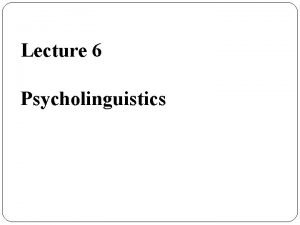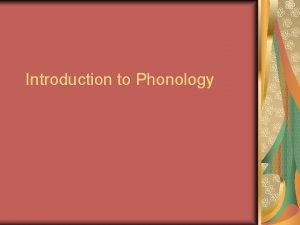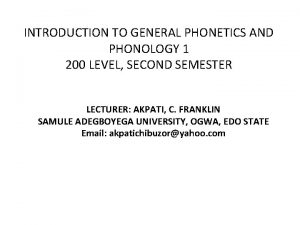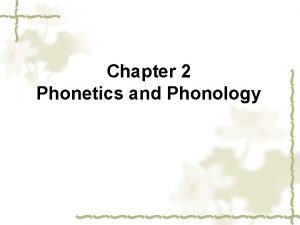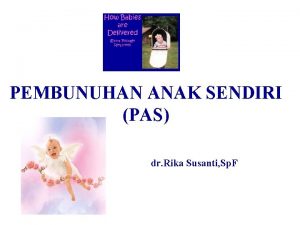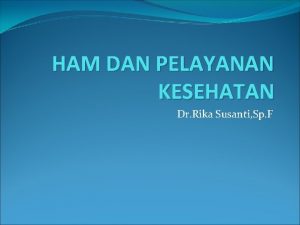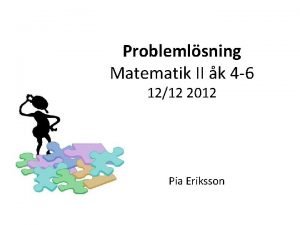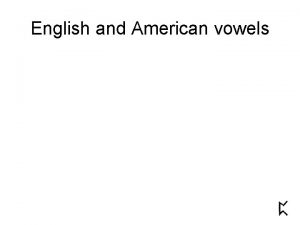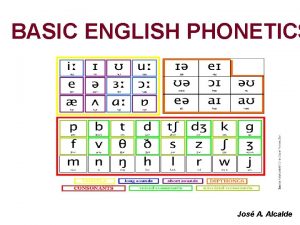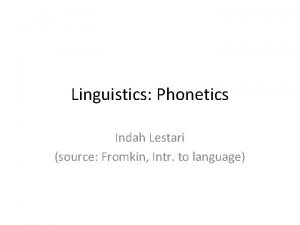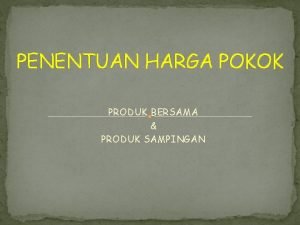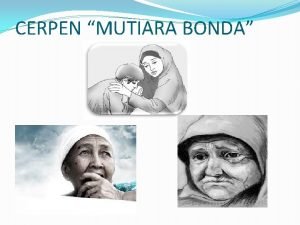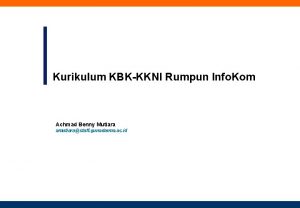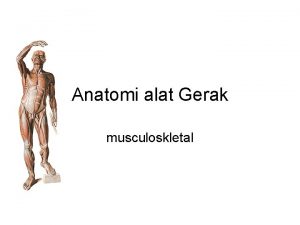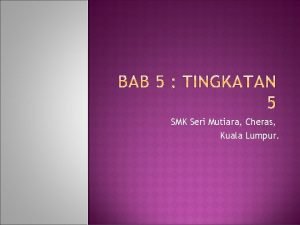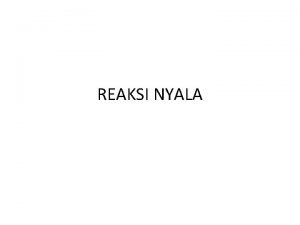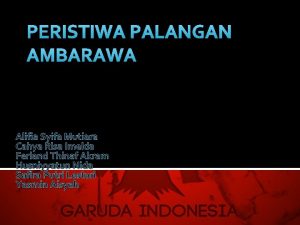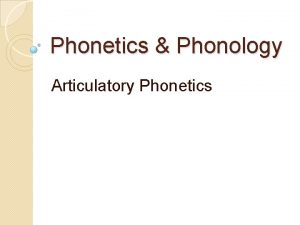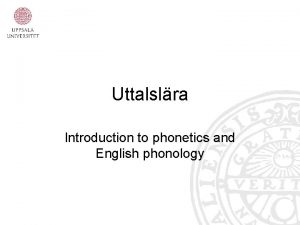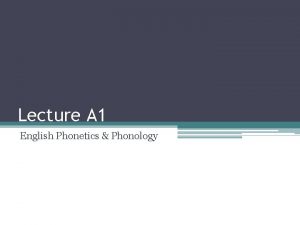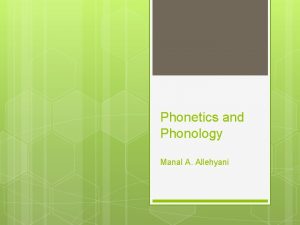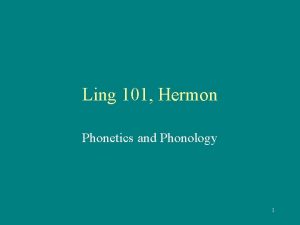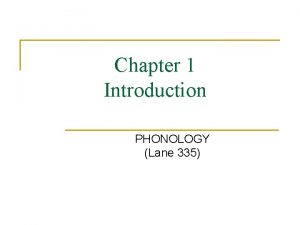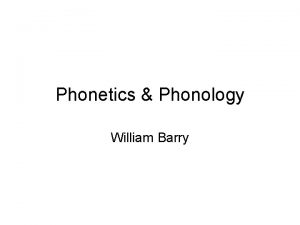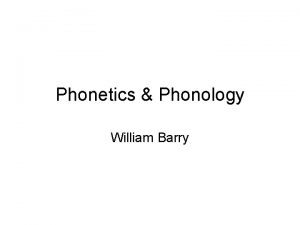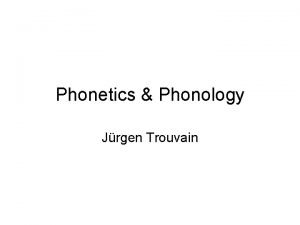ENGLISH PHONETICS AND PHONOLOGY SESSION 12 RIKA MUTIARA


































- Slides: 34

ENGLISH PHONETICS AND PHONOLOGY SESSION 12 RIKA MUTIARA, S. Pd. , M. Hum. PENDIDIKAN BAHASA INGGRIS, FKIP

Learning Outcomes • Students are able to identify variants of weak forms.

Why should we learn how weak forms are used? • Most native speakers of English find an “allstrong form” pronunciation unnatural and foreignsounding. • Speakers who are not familiar with the use of weak forms are likely to have difficulty understanding speakers who do not use weak forms. • All words which have both a strong and weak form belong to a category that may be called function words (auxiliary, preposition, conjunction, etc). •

the • də (before consonants) 'shut the door' • di (before vowels) ‘wait for the end'

a, an • ə (before consonants) 'read a book‘ • ən (before vowels) ‘eat an apple'

and • ən (sometimes ṇ after t, d, s, z, ʃ) • ' come and see' • ' fish and chips'

but • bət 'It's good but expensive'

that • This word only has a weak form when used in a relative clause; when used with a demonstrative sense it is usually pronounced in its strong form • dət ‘The price is the thing that annoys me'

than • dən ‘better than ever‘

his • iz , (hiz at the beginning of a sentence) 'Take his name' • Another sense of 'his' , as in 'it was his' has always the strong form.

her • When used with possessive sense, proceeding a noun; as an object pronoun, this can also occur at the end of a sentence. • ə (before consonants) 'Take her home' • ər (before vowels) 'Take her out'

your • jə (before consonants) ' Take your time' • jər (before vowels) 'On your own'

she, we, you • This group of pronouns has weak form pronounced with weaker vowels than the i: and u: of their strong forms. • 'she' ʃi ' why did she read it? ' • 'he' i (the weak form is usually pronounced without h except at the beginning of a sentence). • ' Which did he choose? ' • ' He was late, wasn't he? '

she, we, you • 'we' wi ' How can we get there? ‘ • 'you' ju ' What do you think? '

him • ‘him’ im • 'Leave him alone' • 'I've seen him'

her • ə (hə when sentence –initial) ' Ask her to come'

them • dəm 'leave them here'

us • əs 'Write us a letter'

Weak forms • The next group of words (some prepositions and other function words) occurs in their strong form when they are final in a sentence. • This also depends on the intention of the speaker, the situation, the pitch level of the word.

at • ət ' I'll see you at lunch' • In the final position: æt ' What's he shooting at? '

for • fə (before consonants) 'Tea for two' • fər (before vowels) 'Thanks for asking' • fↄ: (in the final position) ‘What's that for?

from • frəm 'I'm home from work' • frↄm (in the final position) 'Here's where it came from'

of • əv 'Most of all' • Ɔv (in the final position) 'Someone I've heard of. ‘

to • tə (before consonsnts) 'Try to stop' • tu (before vowels) 'Time to eat' • In the final position: tu (It is not usual to use the strong form tu: , and the pre-consonantal weak form tə is never used). 'I don't want to'

as • əz 'As much as possible' • æz (in final position) 'That's what it was sold as'

some • In one sense (typically, when it occurs before a countable noun, meaning "an unknown individual") it has strong form: sʌm • ' I think some animal broke it' • If it comes before uncountable nouns (meaning "an unspecified amount of"), in such uses it has the weak form: səm. • sʌm (in final position) 'I've got some'

there • When this word has a demonstrative function; it always occurs in its strong form : deə (deər before vowels), e. g. 'There it is' • də (before consonants) 'There should be a rule' • deər (before vowels) 'There is' • In the final position the pronunciation may be də or deə. ' There isn't any, is there?

can, could • kən, kəd 'They can wait' and 'He could do it' • kæn, kʊd (in final position) 'I think we can‘ and 'Most of them could'

have, has, had • • əv, əz, əd (with initial h in initial position) 'Which have you seen? ' ‘Which has been best? ' 'Most had gone home' hæv, hæz, hæd (in final position) 'Yes, we have' 'I think she has' 'I thought we had'

shall, should • • • ʃəl or ʃḷ ; ʃəd ‘We shall need to hurry' ʃæl , ʃʊd (in the final position) ' I think we shall' ' So you should'

must • • • məs (before consonants 'You must try harder. ' məst (before vowels) 'He must eat more. ' mʌst (in final position) ‘She certainly must. '

do • • • də (before consonants) 'Why do they like it? ' du (before vowels) ‘Why do all the cars stop? ' dəz ' When does it arrive? ' /wen d∂z It ∂'ra. Iv/ du: , dʌz (in final position) ' we don't smoke, but some people do' ' I think John does'

am, are, was, were • • • əm 'Why am I here? ' ə ( before consonants) 'Here are the plates' ər (before vowels) 'The coats are in here' wəz 'He was there a minute ago' wə (before consonants) 'The papers were late' wər (before vowels) 'The questions were easy'

am, are, was, were • • • æm, a: , wↄz, w. З: (in final positions) ' She's not as old as I am' ' I know the smiths are' ' The last record was' ' They weren't as cold as we are'
 Allophones
Allophones Difference between phonetics and phonology
Difference between phonetics and phonology Phonological rule
Phonological rule Phonetics and phonology
Phonetics and phonology Introduction to english linguistics exercises answers
Introduction to english linguistics exercises answers Difference between phonetics and phonology
Difference between phonetics and phonology Phonology
Phonology Introduction to general phonetics and phonology
Introduction to general phonetics and phonology The difference between phonetics and phonology
The difference between phonetics and phonology Cardinal vowels
Cardinal vowels Phonetics and phonology
Phonetics and phonology Assimilation linguistics
Assimilation linguistics Phonetics vs phonology
Phonetics vs phonology Coasta rika
Coasta rika Kano rika 2b
Kano rika 2b Rika susanti
Rika susanti Dr rika susanti
Dr rika susanti Uji apung paru positif
Uji apung paru positif Dr rika susanti
Dr rika susanti Dr rika susanti
Dr rika susanti Polyas fyra faser
Polyas fyra faser Aan rika gedicht analyse
Aan rika gedicht analyse Onset, nucleus coda examples
Onset, nucleus coda examples American english phonology
American english phonology Basic english phonetics
Basic english phonetics Definition of phonetics
Definition of phonetics Penjodoh bilangan pisang dan kelapa
Penjodoh bilangan pisang dan kelapa Pt mutiara memproduksi 3 macam produk
Pt mutiara memproduksi 3 macam produk Mutiara bonda
Mutiara bonda Benny mutiara
Benny mutiara Hanbo engineering & construction
Hanbo engineering & construction Articulatio globoidea
Articulatio globoidea Pembentukan sistem ahli
Pembentukan sistem ahli Api bunsen
Api bunsen Mutiara adik cahya
Mutiara adik cahya





